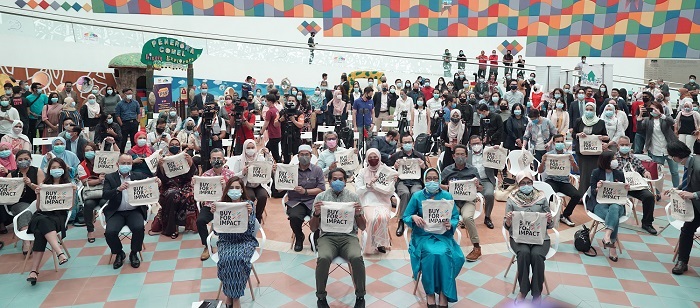With #BuyForImpact, MaGIC aids social enterprises in overcoming major challenges
By Tan Jee Yee November 6, 2020
- #BuyForImpact helps SEs create awareness, gain potential investment inquiries
- With SIM Grant, MaGIC matches money crowdfunded to help social innovators

For Aida Zunaidi, cofounder of mom-centric online marketplace Ibupreneur, running a social enterprise almost feels like a high-stakes game of whack-a-mole. “There are a lot of challenges that come at unexpected times, every time! We solve one problem, another one appears,” she quips.
These are not problems that you can hammer away easily, either. As Aida notes, running a sustainable business with a model that ensures financial returns while having a social impact is tough. You need visibility. You need talent. You need the capital and revenue consistency to grow your outreach, find partners, expand marketing.
Ibupreneur, which empowers financially dependent and vulnerable mothers (particularly single, B40 or retired mothers) to grow into micro-entrepreneurs through their marketplace and upskilling workshop, faces another concern – morale. Aida says that they have difficulty in keeping the mother entrepreneurs mentally engaged throughout the entire business progress, especially when income or revenue is not coming in.
Which is why the recent #BuyForImpact movement, organised by the Malaysian Global Innovation and Creativity Centre (MaGIC) with support from Lazada (including a special page), became such a vital aspect to Ibupreneur’s sustainability. #BuyForImpact, which aims to promote a socially-conscious buying behaviour among the general public, helped showcase Ibupreneur’s talents in a one-stop centre at RexKL, which is a performance and cultural space in Kuala Lumpur, Malaysia.
“The products we sold immediately received orders after the event ended. We also received inquiries for potential investments!” exclaims an excited Aida. “That helps us to grow in the long-term.”
It’s also a big morale boost to help generate awareness on the social enterprise (SE) ecosystem to the community at large. This, according to Aida, is crucial for SEs to grow in Malaysia.
“When our community learns that social enterprises have the power to make a change for our own people, it drives traction to support businesses like ours. It was an impactful weekend for the SE community to voice out when there were a large number of us at one place!” she says.

Challenges and solutions
Ibupreneur’s challenges are common problems faced by social enterprises in Malaysia. MaGIC chief executive officer Dzuleira Abu Bakar points out the three main challenges faced: Market Outreach, Capital and Talent.
For one, market penetration of SE products is relatively low despite being locally made. This is largely due to low levels of awareness, plus the fact that SEs have to compete with other businesses in terms of quality while managing the social impact they intend to create. “In addition, SEs lack skills to deliver their impact stories to their audience,” says Dzuleira.
On top of that, capital invested for social impact is typically limited, as like-minded investors or financiers are hard to come by. “Although impact investment has been vibrant in our neighbouring countries such as Thailand and Singapore as well as in the West, the landscape here in Malaysia is fairly premature,” elaborates Dzuleira.
“The SE community is still immaterial to regulators or capital providers who traditionally focus on profit return.”
Lack of funding also means a difficulty in landing talent, which Dzuleira says is a “key tangible in driving the prospect of a SE.” After all, talent is what helps devise a sustainable business model that can both scale and be socially impactful. You need the right people for things like marketing, business strategy, stakeholder engagements and technology.
This is where movements like #BuyForImpact comes in. It highlights how social enterprises differ from typical businesses, and thus creates a relationship with like minded, socially-conscious people. “In addition, the movement has drawn individuals who truly care about making a difference, they who will invest and mentor these SEs providing them the capital and skills to create products which can compete with the masses,” Dzuleira says.

Corporate partnerships
#BuyForImpact also connects SEs to impact investors – essentially investors who are looking to scale businesses who can deliver solutions to tackle social or environmental problems.
To foster talent, Dzuleira says that it’s important for SEs to form partnerships with corporates. “We have noticed a strong supportive network amongst the SE community. They are individuals with a passion for change, and are very open to working with one another through collaborations by sharing their talents,” she elaborates. #BuyForImpact can help raise awareness, and subsequently connect SEs to corporates.
Alliance Islamic Bank (AIS) is one such connection. They supported the #BuyForImpact movement through their own social procurement efforts, ensuring that gifts to partners and customers during the festive seasons and events are procured from SEs to create more meaning awareness of this segment. They also showcased selected SEs at their various events.
In the early days of the MCO, Alliance Islamic Bank collaborated with MaGIC, Citrine Capital and NGOhub on the Social Enterprise Sustainability Initiative, with the aim of helping SEs stay in business.
“Through the alliance with our strategic partners, we were able to build an ecosystem where the SEs can sustain their operations and assist communities-in-need at the same time,” comments Alliance Islamic Bank CEO Rizal Il-Ehzan.
“Through this ecosystem, we were able to raise the fund needed via our crowdfunding platform, SocioBiz, to purchase food items and hygiene essentials from SEs to distribute it to communities-in-need, especially the B40 segment.”
According to Rizal, the initiative allowed them to aid 11 SEs continue operating on an extended lifeline for an average of 1.3 months.
“This helped to sustain employment for 67 low-income employees. In addition, we were able to provide 7,000 units of hygiene essentials and over 67,000 meals to communities-in-need. We also provided essential PPEs, hospital equipment and meals to healthcare front-liners during the COVID-19 pandemic,” he elaborates.
.jpg)
Impacting SEs
One can already see the positive effects of #BuyForImpact, which ran a campaign across September with various initiatives. For instance, their 20 Questions segment, which features 16 SEs answering 20 questions on video, saw 11,784 views in total.
The SE Showcase @ RexKL, which featured 36 SEs, generated more than US$9,900 (RM40,000) in sales. In a partnership with Lazada, 15 SEs were featured on the e-commerce platform as part of the #BuyForImpact Month. 442 products were listed.
A key takeaway from #BuyForImpact, Dzuleira says, is that awareness of SEs at a consumer level is generally still nascent.
“However, once consumers are more aware of the concept of social enterprise, they are able to make informed consumption decisions and are more willing to spend as they understand how the power of every ringgit spent can change the social development landscape of the nation,” she adds.
Rizal adds that #BuyForImpact creates further impetus for more people to think about where their products come from, and whether or not the products are doing good for society and the environment.
“It is about understanding that every individual has the power to make a change, and that change can be effected in the most rudimentary of things like what we buy and the businesses we support,” he adds.
Bigger role for MaGIC
Dzuleira also sees a bigger role to be played by MaGIC to increase outreach, educate the public and sustain a nationwide movement towards an inclusive consumerism.
And more is being done. MaGIC recently launched the Social Impact Matching (SIM) Grant, which aims to help social innovators grow to scale their impact.
“Its purpose is to help enterprises who have a social mission recover from Covid-19,” Dzuleira explains. For every one ringgit crowdfunded, the SIM Grant will match another ringgit to help enterprises and social innovators, with a social purpose, to invest back into their organisations.
It is open to entities who use business as a tool to solve social and environmental concerns (SEs in general). “The support which the SIM Grant provides is important for entities to invest back into their organisation to grow and scale to combat the effects of Covid-19,” Dzuleira stresses.
According to Rizal, AIB’s collaboration with MaGIC on the SIM grant magnifies the size of funding they are able to provide to SEs. “To support the efficacy of the SIM grant programme, we help SEs with their grant application and subsidise the cost of running their fundraising campaign on SocioBiz,” he notes.
Additionally, MaGIC has developed an Impact Measurement and Management Tool for SEs to assist them in reviewing their mission and how they have been performing to reach their goals.
SEs need all the help they can get. “Our social enterprise ecosystem needs to be more extensive. MaGIC does a wonderful job in accelerator programs, developing us as entrepreneurs, and developing ideas,” says Aida Zunaidi of Ibupreneur. As such, it’s important for SEs to get in touch with agencies like MaGIC, and take advantage of its many initiatives like #BuyForImpact and the SIM Grant to boost their outreach.
Social enterprises, ultimately, need all of our help. Consumers, corporates and governments – we are all part of society. It makes sense to aim for social good.

